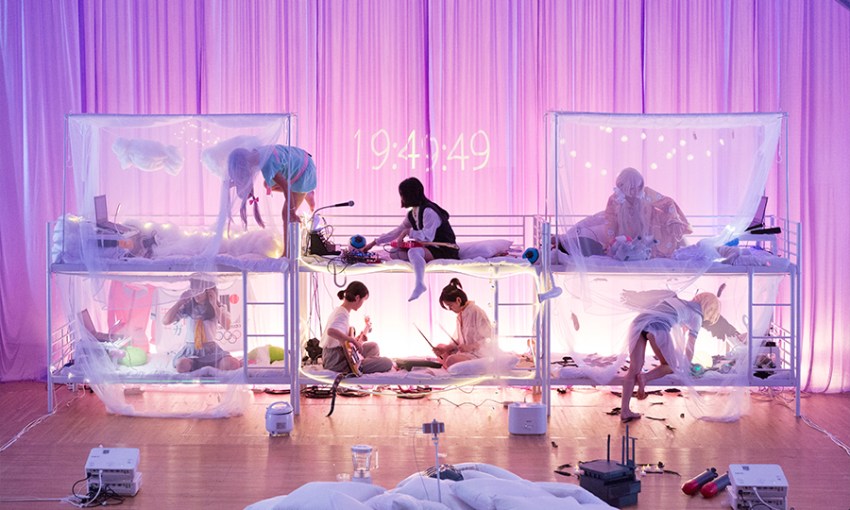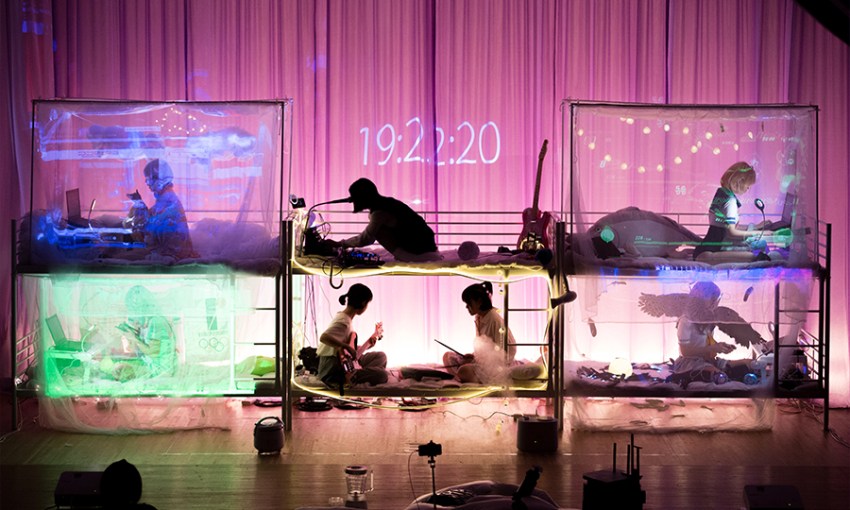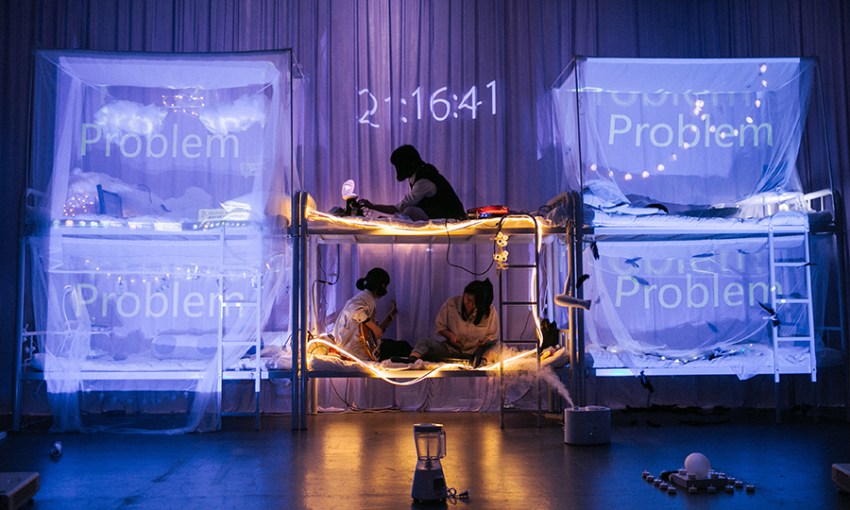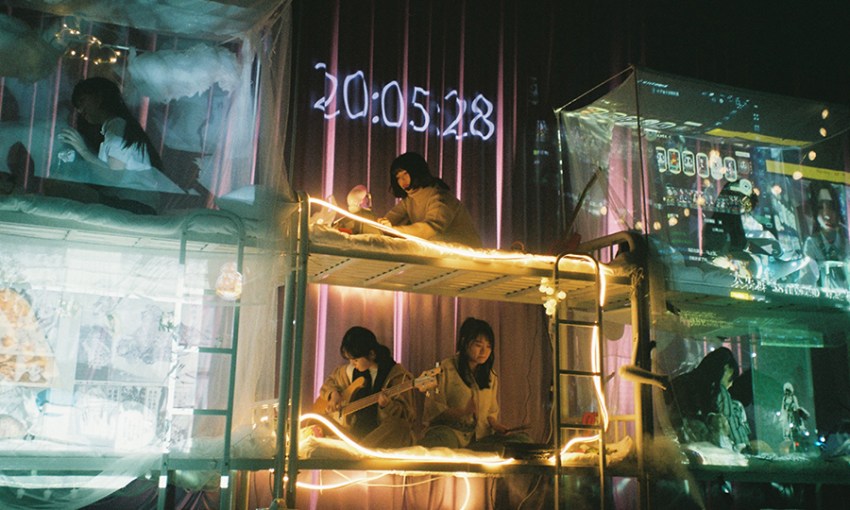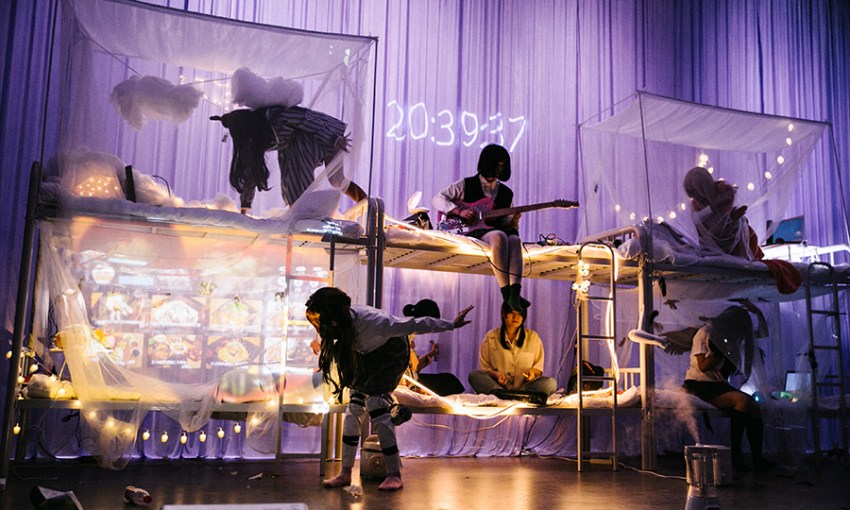Originating in China, Here Is The Message You Asked For... Don't Tell Anyone Else ;-) is not just another hand-wringing contemplation about the clash of virtual and physical realities. Instead, it pushes the audience to consider the importance and complexity of online escape.
Anywhere but here
Half theatre work and half art installation, Here Is The Message You Asked For… Don’t Tell Anyone Else 😉 will make its Australian premiere as part of OzAsia this November.
Here Is The Message You Asked For… Don’t Tell Anyone Else 😉 will be performed November 1-3 in the Space Theatre for OzAsia 2018.
But while Australian audiences – in considering the group of millennial Chinese girls messing around with their phones and computers onstage – might feel able to immediately recognise its universal themes, the work runs deeper than a lament for what is lost when we forego the “real” world for what we find online.
Director Sun Xiaoxing’s thinking about virtual lives doesn’t originate from a concern for the slow death of a non-digital life, but arises from a consideration of the online sphere’s vital role in Chinese youth culture.
“In the context of increasingly tightened control of internet in China, this kind of exploration is extremely necessary,” he says. “Internet reality is an ‘online China’. In the past, young people occupied it, operated a unique culture of their own, and this had impact on the physical reality.”
“A LOT OF CHINESE YOUNGSTERS CHOOSE TO BE ‘NEW IMMIGRANTS’ IN THE DIGITAL ERA IN ORDER TO LEAVE ‘HERE’.”
Now, though, says Sun – as internet realities become more and more immersive – the compulsion to exist online creates a complicated dissonance in individuals.
For young Chinese people the virtual world no longer just seems like a space for unfettered thought and interaction, but also a place where they could escape completely and irrevocably.
“A screen becomes a path to ‘another world’,” says Sun. “A lot of Chinese youngsters choose to be ‘new immigrants’ in the digital era in order to leave ‘here’.
“My interest is on these ‘new immigrants’ and the pressure that ‘another world’ imposes on ‘here’.”
To explore these ideas, Sun has modeled the universe of Here is The Message You Asked For… as a reflection of the feelings generated by navigating between physical and virtual worlds.
The stage design is a cross between a dormitory and a glass fishbowl, where the audience are given a voyeuristic and seemingly revealing glimpse into the lives of the performers.
But, given who the actors are – a mix of cosplay identities and members of a girl band, each of whom project fantasy as part of their public identities – their actions have a tinge of the manufactured.
This tension between the authentic and the fake mirrors what we experience online, and creates a deep sense of unease for the audience.
“I hope to create a spectacle – a spectacle that denies the ‘reality’ intensively,” Sun says. “It needs to go through the ‘kawaii’ (cute) appearance and generate confusion, or even unrest. It may be a feeling of terror.”
While the audience is alienated by the unreliability of what’s presented to them on stage, they’re also invited to become part of it.
During the performance, attendees are asked to download messaging app WeChat and to live-communicate with the actors.
“[The] audience not only need to watch the performance on the stage but also the screen in their hands, which constructs multiple focuses of spectating,” says Sun.
“In the chatting application, audiences have the potential possibility to become one of the performers, which injects the cold interface of a mobile phone screen with theatrical energy. Endless emoji texting is like a carnival, at which internet reality and physical reality synchronises.”
The non-narrative nature of Here is The Message You Asked For… leaves plenty of space for those watching to consider the potential and danger of withdrawing from the physical world, but from the new perspective of those who veer toward the digital not as a choice, but out of necessity.
Sun Xiaoxing was interviewed via a translator, and some of his quotes have been slightly altered to improve their syntax in written English.



